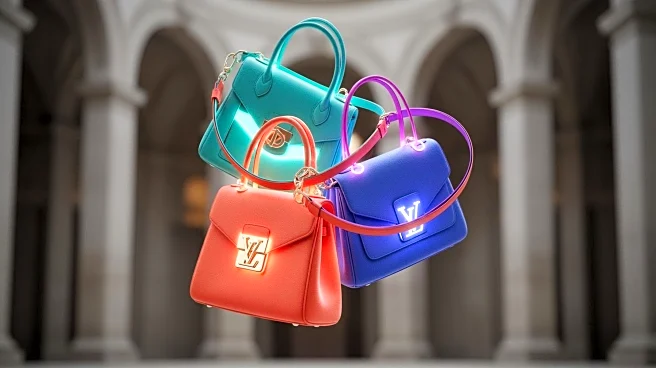What's Happening?
The European Commission has imposed a €157 million fine on three major fashion brands—Gucci, Chloé, and Loewe—for violating EU antitrust laws. The Commission found that these brands restricted their retailers from setting their own prices, thereby reducing
competition and limiting consumer choice. This practice involved preventing retailers from undercutting recommended prices, capping discounts, and adhering to brand-dictated sales windows. The investigation, which began in 2023, revealed that these brands enforced pricing policies that stripped independent retailers of pricing freedom across their product ranges, including apparel, leather goods, footwear, and accessories. Gucci was fined €119 million, Chloé €19 million, and Loewe €18 million, with reductions applied for cooperation during the investigation.
Why It's Important?
This decision by the European Commission underscores the importance of fair competition and consumer protection within the EU market. By fining these luxury brands, the Commission aims to ensure that consumers benefit from genuine price competition, which can lead to lower prices and more choices. The ruling also serves as a warning to other companies that similar practices will not be tolerated. The fines highlight the EU's commitment to maintaining free and undistorted competition, which is crucial for consumer welfare and market efficiency. The decision may encourage other retailers to challenge restrictive pricing policies, potentially leading to more competitive pricing strategies across the industry.
What's Next?
Following the Commission's decision, consumers and rival companies affected by these practices can pursue damages in national courts, using the Commission's findings as binding proof of unlawful behavior. This could lead to further legal actions and compensation claims against the fined brands. Additionally, the ruling may prompt other companies to review and adjust their pricing strategies to comply with antitrust regulations. The fashion industry might see increased scrutiny from regulatory bodies, leading to more transparent and competitive pricing practices. The Commission's decision could also influence similar investigations in other sectors, reinforcing the EU's stance on antitrust enforcement.
Beyond the Headlines
The ruling has broader implications for the luxury fashion industry, which often relies on maintaining a prestigious image through controlled pricing. By challenging these practices, the Commission is addressing the balance between brand image and consumer rights. The decision may lead to a shift in how luxury brands manage their pricing strategies, potentially affecting their market positioning and consumer perceptions. It also raises questions about the ethical considerations of pricing control and its impact on market dynamics. The case highlights the ongoing tension between brand protection and competitive fairness, which could influence future regulatory approaches in the industry.















